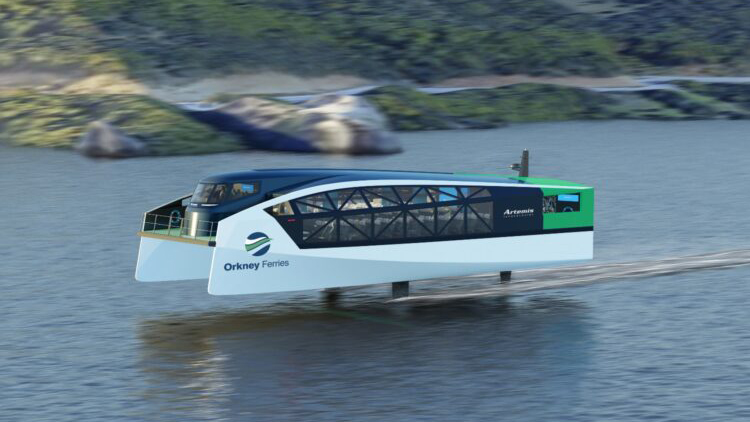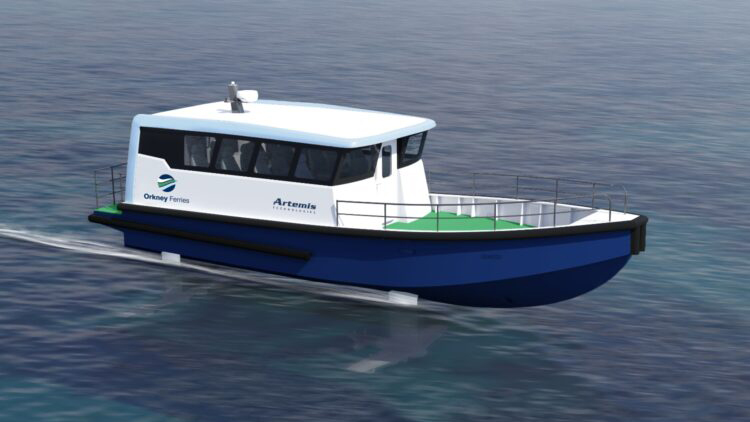A new project demonstrates the benefits of electric-powered hydrofoil workboats and passenger ferries to service the Orkney Islands.

Maritime design and applied technologies specialists Artemis Technologies are taking the lead on a new project to demonstrate the benefits of electric-powered hydrofoil workboats and passenger ferries to service the Orkney Islands.
The 13 islands are currently served by 74 different route combinations, undertaken by nine diesel-fuelled vessels, creating a real opportunity for innovation of the transport service for people and businesses alike.
Inter-island transport is fundamental to the social and economic life of the Orkney community. Conventional vessels need replacing with more efficient, sustainable and net zero alternatives to secure the longer-term viability of the services in the area.
Electric Orkney
The Electric Orkney project is looking to play a key role in decarbonising maritime transport in Orkney. It is also looking to provide data and proof of concept information that will enable the wider adoption of electric power in the sector across a variety of industrial and passenger-focused services.
Under the project plan, the Electric Orkney partners will build, deploy and operate their two highly innovative hydrofoil vessels. It will demonstrate the diesel replacement opportunity for both inner and outer island routes and use cases, as well as the wider benefits of the vessel design for improved journey standards.
Supported by novel charging infrastructure in the form of shore-based battery energy storage points, the project will also have a strong digital focus. It will provide data for new digital twin technology that will support the commercial and development stages of the project after initial demonstration.
The project scope
The project is led by Artemis Technologies, who are working alongside experts at Orkney Ferries and the European Marine Energy Centre to develop this vessel-led solution.
At the heart of the project are two state-of-the-art boats that offer a faster, smoother, more efficient and clean energy-powered journey for users. The first, a 12-person workboat vessel, will connect an inner island route four daily rotations. The second is a larger vessel with the capacity to support 50 passengers and light cargo in journeys up to five times a day around outer island routes.
In conjunction with the vessels themselves, the project will design, deploy and operate shore-based, DC fast-charging infrastructure at two locations on Orkney. This includes undertaking the necessary work to incorporate the docking of the vessel and housing of the charging elements into existing space within the harbour.
The project will also see substantial work around data collection to analyse operational outcomes and wider performance and efficiency information. This data will be essential to validate operations in the challenging Orkney environment, which will support the wider uptake of the technology and vessels in future, while meeting necessary regulatory and operational requirements.
Artemis Technologies Ltd: Zero Emission Vessel and Infrastructure Competition winner
Aims and ambitions
The Electric Orkney project’s underlying aim is to revolutionise the inter-island maritime operations, helping to secure the longer-term future of a service that requires a new approach to fuelling and journey efficiency.
In environmental terms, the move to higher-quality and electric-powered crafts has the potential to secure up to 90% energy savings when compared to the existing diesel vessels. This means almost 11,000T of carbon dioxide equivalent each year being removed by the two demonstration boats alone. The project is also looking at securing evidence of valuable reductions in air, water and noise pollution.
In economic terms, the project has the ability to:
- demonstrate substantial savings for vessel owners through reduced maintenance and fuel costs
- provide evidence of the financial opportunity around increased tourism
- alleviate supply and commuting constraints that can limit growth within the region
Looking at the opportunity these vessels bring, Simon Williams, Chief Systems Engineer and Director of Technical Operations for Energy Solutions at Artemis Technologies, said:
The design of these vessels reaches beyond the simple exchange of diesel fuel for stored electrical energy, although that in itself is a significant step forward for the maritime sector in its net zero efforts. Their innovative construction not only enables a faster and more efficient journey while significantly reducing operational costs and emissions, but also provides a better experience for passengers which will help increase the use of these services and continue to extend their benefits further.
About the funding
This project is part of the Zero Emission Vessels and Infrastructure (ZEVI) scheme, funded by UK government and delivered by Innovate UK.
As part of ZEVI, the UK Department for Transport has allocated £80.4 million funding to 10 projects to build clean maritime vessel and infrastructure solutions by March 2025 and operate them until March 2028. The projects are supported by 52 organisations across the UK and will leverage over £40 million private investment.
The ZEVI scheme is part of the department’s UK Shipping Office for Reducing Emissions (UK SHORE) programme, a £206 million initiative focused on developing the technology necessary to decarbonise the UK domestic maritime sector.


